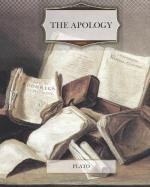|
|
The Apology The Defense (Section 2)
He interviewed a man with a high reputation for wisdom in order to disprove the oracle. However, when he examined this person and conversed with him, he realized that people only thought this person was wise, and the person also thought he was wise, when in fact, Socrates realized that he was not. When Socrates tried to show him that he was overestimating his wisdom, he, and other people present, resented his efforts.
As he left, he realized that he was wiser than this man because even though neither of them had any knowledge to boast of, the man thinks that he does, whereas Socrates is aware that he doesn't. Thus, Socrates is wiser than the man because he does not think that he know things that he does not know.
Socrates then interviewed a man of an even greater reputation for wisdom, and came to the same conclusion, again causing the man, and everybody present, to resent him. He did this again and again. Although Socrates knew that he was becoming unpopular, the god's business and oracle's words were more important, and he wanted to interview with everyone who was known to have knowledge. As a result, he realized that the people with greater reputations were less wise than those with inferior reputations.
After he interviewed all the 'wise' politicians, he turned to the poets. He chose some of their best works, and asked them about the meanings in them, hoping to expand his knowledge. He soon came to the conclusion that any person could explain their poems as well as they could, and that it was not wisdom that enabled them to write their poetry, but instinct and inspiration. Furthermore, "the very fact that they were poets made them think that they had a perfect understanding of all other subjects, of which they were totally ignorant." Line 22c
Lastly, he turned to the skilled craftsmen. Since he knew nothing about this area, he knew he would find them all full of knowledge. He was happy about this as they understood things that he didn't and therefore could be considered wiser than he was. However, they had the same fault of the poets: "on the strength of their technical proficiency they claimed a perfect understanding of every other subject...." Line 22d He found this fault to be greater than their wisdom. As a result, he asked himself whether he would rather have their wisdom and ignorance, or have neither. His answer was that he preferred to be the way he was.
His examinations have caused many people to dislike him and be hostile towards him, in a persistent and malicious way, making wrong suggestions about him.
This is because "whenever I succeed in disproving another person's claim to wisdom in a given subject, the bystanders assumed that he know everything about that subject myself." Line 23a But Socrates isn't arrogant about his own knowledge or wisdom; he believes that human wisdom has little or no value.
As he realizes this, it seems apparent that when the oracle named him as the wisest person, they did not name him as Socrates, but instead named him as an example of a person who realizes that human wisdom is worthless. That is why he believes that it is his divine duty to teach all who think that they are wise but are not, that they are not.




